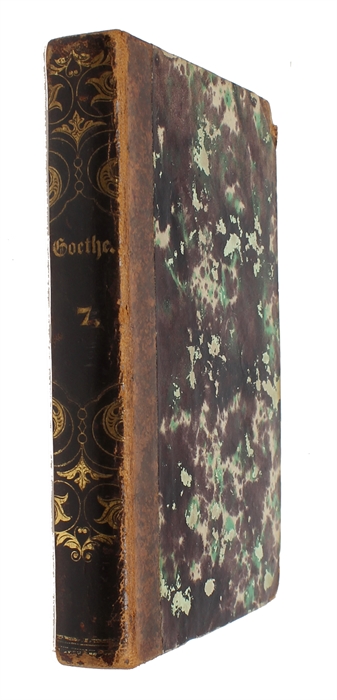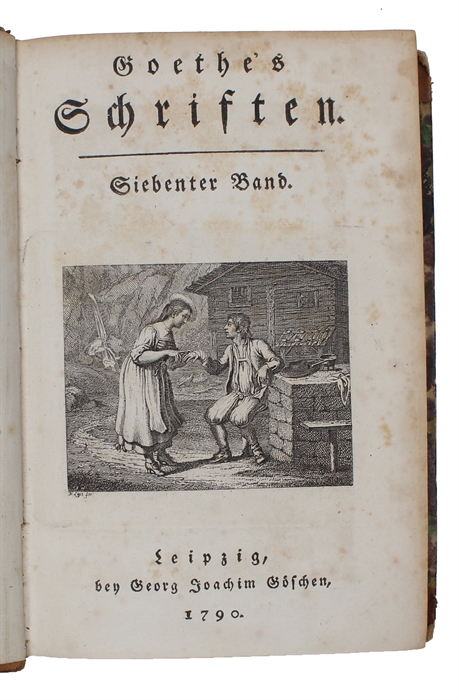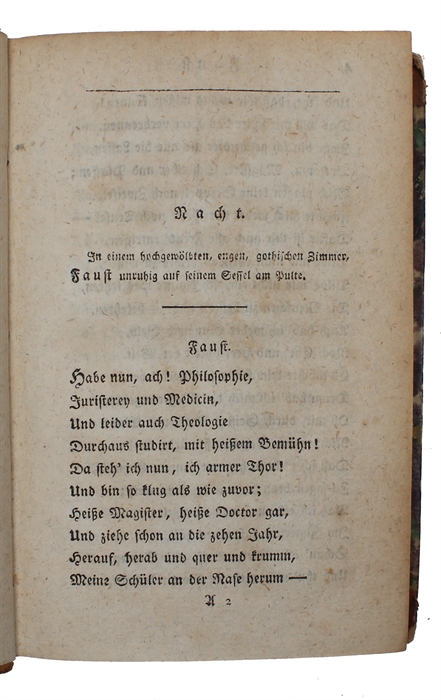PMM 298 - THE FAUST LEGEND
GOETHE, JOHANN WOLFGANG von.
Faust. Ein Fragment.
Leipzig, 1790.
Very nice contemporary half calf with beautifully gilt spine. Corners worn and some wear along hinges and capitals. But overall very nice and completely unrestored. Brownspotted, as usual due to the paper quality. With the famous engraved frontispiece (Faust in his study, by Lips, after Rembrandt) and the tittle-page stating "Goethe's Schriften. Siebenter Band.", with the large engraved vignette by Lips, picturing Bätely bandaging Jery's hand (different from the ones in the seven other volumes), and the half-title stating "Faust. Ein Fragment" and at the bottom "Goethe's W. 7. B." (which is also repeated on f. D). Old owner's name to front fly leaf and a corresponding small piece of front free end-paper cut out to show the name.
The scarce first printing of one of the peaks of world literature, the magnum opus by Goethe, the greatest German poet ever and one of the all-times greatest writers of the world. Few other writers have been as influential as Goethe, and his works were an immense source of inspiration to everything from drama and music to science and philosophy. He is generally accepted as one of the most important thinkers within Western culture, and his main work, Faust, is considered one of the most important and influential works of world literature. "If Goethe may justly be called the last representative of the renaissance ideal of the "oumo universale", his "Faust" embodies the sum total of his poetical growth." (Printing and the Mind of Man: 298).
"Faust" was first printed, as it is here, as volume seven of Goethe's Schriften in eight volumes from 1787 - 1790, and was also published separately, likewise under the title "Faust. Ein Fragment". The printing of Faust in the seventh volume of Goethe's works is the original printing, after the manuscript of the poet. It can be identified by the mistaken repetition on the bottom of page 144 of the three verses on top of page 145. Hagen 11:7: "Vom Bd. 7 Bg. F-T existieren zwei Drucke", between which there is no precedency. This is the Sm with all the pointers mentioned in Hagen (e.g. 89,1: leseni, 152,14: vollkomm'nes, 261,21: Er ist bitter).
"Faust" is arguably the work for which Goethe is most famous, and this is not without reason. The novel emphasizes the strength of the individual and the right to freely investigate aspects of human and divine character. The novel also fights for man's right to determine his own destiny and is thus considered the first great literary work in the spirit of modern individualism. The work is also considered highly relevant to science and scientific thought, as Goethe here offers a holistic and non-analytic approach to these fields.
Hagen: 11,7: sm.
Order-nr.: 60842



